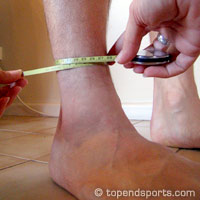Girths are circumference measures at standard anatomical sites around the body. The Ankle girth measurement is a measure of the circumference at the level of the narrowest point of the ankle.
purpose: to measure the circumference of the ankle, as one of the many measurements of body size.
equipment required: flexible metal tape measure and pen suitable for marking the skin. If a plastic or cloth tape is used, it should be checked regularly against a metal tape as they may stretch over time.
pre-test: Explain the test procedures to the subject. Prepare forms and record basic information such as age, height, body weight, gender. See more details of pre-test procedures.
 procedure: This girth measurement is usually taken on the right side of the body, at the level of the narrowest point of the ankle. The minimal girth point is not always obvious, and the tape may need to be moved up and down to find the point of least circumference. When recording,
you need to make sure the tape is not too tight or too loose,
is lying flat on the skin, and is horizontal. It may help to have the subject stand on a box to make the measurement easier.
procedure: This girth measurement is usually taken on the right side of the body, at the level of the narrowest point of the ankle. The minimal girth point is not always obvious, and the tape may need to be moved up and down to find the point of least circumference. When recording,
you need to make sure the tape is not too tight or too loose,
is lying flat on the skin, and is horizontal. It may help to have the subject stand on a box to make the measurement easier.
reliability: Factors that may affect reliability include changes to the testing personnel, constant and even tension on the tape, and correct landmarking (finding the correct anatomical site for measurement).
advantages: low costs involved in the testing procedure, and ease of self testing
comments: Girth measurements combined with skinfold measurements can give a clearer picture of changes in tissue composition and distribution of muscle and fat.
Similar Tests
- Other girth measurements
Related Pages
- General description of taking girth measurements, and links to other girth measurement sites.
- Using MyoTape for girth measurement.
- A discussion about Body Size Testing
- Other anthropometric tests
- Videos of Anthropometric Tests


 Current Events
Current Events